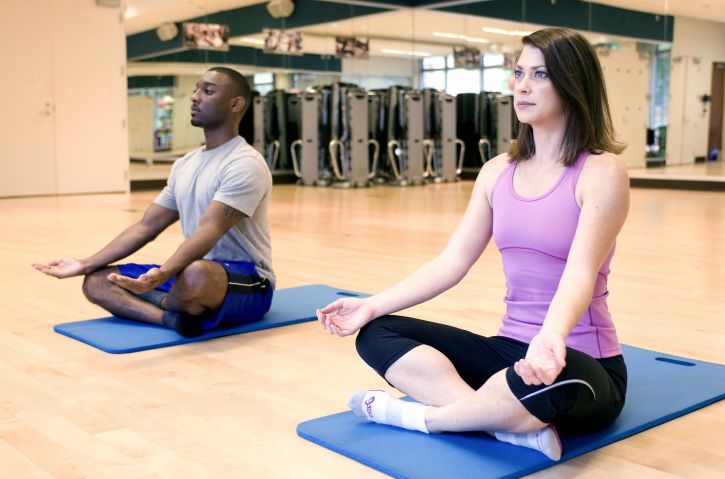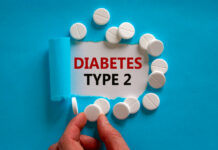A combination of exercise and meditation done twice a week over two months may reduce depression symptoms by 40 percent, according to a new study published open-access this month in Translational Psychiatry. Following the eight-week intervention, the student participants that had previously been diagnosed with major depressive disorder (MDD) reported significantly less symptoms and ruminative thoughts and students without any such diagnoses also showed remarkable improvements.

“Scientists have known for a while that both of these activities alone can help with depression,” Tracey Shors, one of the study authors, said in a press release. “But this study suggests that when done together, there is a striking improvement in depressive symptoms along with increases in synchronized brain activity.”
The research study was born out of neuroscientific work on neurogenesis, the production of new neurons created each day in the adult brain. The neurogenesis theory of depression proposes that the production of new cells decreases as depressive symptoms emerge. The researchers point out that stressful life events and trauma are known to reduce neurogenesis and that aerobic exercise can significantly increase the number of new cells produced.
Unfortunately, many of the new cells die off only weeks after being born and do not join the brain’s circuitry. Neurons can be saved, however, when new learning experiences challenge the mind.
“Accordingly, mental training can rescue new neurons from death as long as the learning experience is new and effortful,” they write. “Collectively, these findings suggest that aerobic exercise increases the production of new neurons in the adult brain, while effortful mental training experiences keep a significant number of those cells alive.”
On the basis of this past research, the study authors developed the mental and physical (MAP) training which combines focused attention meditation and aerobic exercise. While previous studies have found that meditation or exercise alone can reduce symptoms associated with depression, but no other studies to date have examined the combined effect of these two interventions.
The authors describe the results of the MAP intervention as “robust,” citing the nearly 40% reduction in depressive symptoms after only eight weeks of training. Additionally, the students from the “healthy” study group, who did not have a diagnosis for MDD, also reported significant reductions in depressive symptoms.
They conclude:
“Until recently, the most common and accepted line of treatment for depression has been psychotropic medications, most notably the selective serotonin reuptake inhibitors and mood stabilizers. However, recent studies indicate that these drugs may not be as effective as once thought and even when they are, relapse often occurs. Various forms of psychotherapy, such as cognitive behavioral therapy, can be efficacious but require considerable time and commitment on the part of the patient, not to mention trained professionals to institute. There are two behavioral therapies, aerobic exercise and meditation, which have demonstrated benefits for individuals suffering with depression, are not accompanied by profound side effects and can be practiced across the lifespan. Here, we provide evidence that demonstrates the effectiveness of a combined behavioral approach in improving mental and cognitive health outcomes in individuals with MDD and otherwise healthy individuals.”
*
Alderman, B. L., Olson, R. L., Brush, C. J., & Shors, T. J. (2016). MAP training: combining meditation and aerobic exercise reduces depression and rumination while enhancing synchronized brain activity. Translational Psychiatry, 6(2), e726. (Full Text)















Wow! So exercise and meditation are 3-4x as effective at “treating depression” as antidepressant pills, if this study is to be believed!
If exercise and meditation are so much better, what a mystery it is that the majority of depressed Americans are overweight/obese, inactive, mindless pill-swallowers….
Report comment
I never cease to be astounded how easily the medical profession (and I’m not just talking psychiatry here) completely ignores extremely significant scientific discoveries when their financial/professional interests are challenged. This study should be reason for a complete rethinking of the medication/brain disease paradigm. It offers a free and empowering alternative that can make patients independently able to address their own distress without having to report in to the psychiatrist for prescriptions. How would this not be huge news? Unless, of course, you WANT your patients to be disempowered, dependent, and to have to report in for prescriptions for the rest of their lives…
—- Steve
Report comment
I think it is important to note that this study used a focussed attention style of meditation. There are some styles of meditation such as open awareness meditation (aka objectless meditation) which can exacerbate rumination and make depressive symptoms worse, and can be particularly hazardous if the depressed person has significant suicidal ideation. I found the explanation of helpful and unhelpful meditation practices on the wildmind Buddhist Meditation site (meditation and depression section) was quite a good overview of this topic.
Report comment
Thanks madcat,
http://www.wildmind.org
Very interesting website.
Meditation works for anxiety as well and it has no negative side effects.
Report comment
Well that last part’s false and far from universal.
I could tell you some stories….
Report comment
…please tell them, lily.c.
Report comment
I agree totally. As I said in my comment, meditation can be hazardous, especially in particular symptom-meditation style combinations. I know this from personal experience as well. Nothing like a silent retreat with plenty of unfocussed meditation when you’re already feeling suicidal to really send you over the edge. In teaching or recommending meditation for any sort of mental health problem, you need to know what you’re doing. It’s not a panacea.
Report comment
I meant to add that another example where meditation can cause harm is that prolonged meditation of a sort where you start to lose the sense of boundaries can exacerbate some psychotic symptoms.
Report comment
If someone does meditation with the attitude “if I do this, I will get something back” (just like taking a pill), and has no idea why it is done etc., then it would not work at all for that person. Meditation has a lot of theory behind it and is something that gradually promotes self-understanding and wisdom into life situations.
Report comment
Naturally, it’s best to take a moderate approach to meditation or exercise at the beginning.
Report comment
I happened to come across this article relating to anxiety and mindfulness:
http://www.theglobeandmail.com/life/facts-and-arguments/my-ruminating-anxiety-trapped-me-in-my-thoughts-but-im-learning-to-wake-up/article28769774/
It talks about the transient nature of thoughts, etc. This is the type of thing I meant when I mentioned ‘theory.’ At the beginning, people can get some benefit from meditation by not ruminating on thoughts (this is probably why this study had positive results). As one gets better at meditation, then they can see for themselves that even the most anxiety provoking thought comes and goes, and one becomes more proficient at catching the thought as soon as it arises. If someone goes for an extended retreat, I think it would be very helpful for them to know about these types of things.
Report comment
My psychologist and psychiatrist claimed regular moderate exercise to be a “sign of mania,” in their medical records, and tried to convince me to stop exercising. I found exercising helpful, so did not take this psychiatric advice.
My Lutheran psychologist and Jewish psychiatrists also claimed a dream query, about what it means to be moved by the Holy Spirit, was a “voice” proving “psychosis.” I did not realize this until after I read their medical records. But I also disagree with this psychiatric belief system, since blasphemy of the Holy Spirit is the one and only unforgivable sin in the entire Holy Bible. Thus, I chose to allow the Holy Spirit move me, and continued praying to God, which I also found very helpful in my healing journey.
I personally don’t believe it’s “scientific” to claim only one religion’s method of meditation is beneficial. I’m quite certain regular moderate exercise and even praying, not just meditation, is beneficial to one’s mental health. And this belief does seem to be supported by “experts,” too.
https://www.psychologytoday.com/blog/more-mortal/201406/5-scientifically-supported-benefits-prayer
And, absolutely praying allows one to maintain hope, while insane psychiatric practitioners are gas lighting you, trying to convince you you have a “lifelong, incurable, genetic mental illness,” and making you actually “psychotic,” via drug induced anticholinergic toxidrome poisonings. I’m not quite certain why today’s psychiatric practitioners think such mental abuse is “appropriate medical care.”
I’m quite certain the mental health industry should get out of the business of gas lighting people to cover up easily recognized iatrogenesis for the incompetent doctors, and child abuse for the religions.
Report comment
You’d know more about your shrinks if they wore their pharmaceutical company logo gratuity tee shirts to the office and examination room when they were seeing patients.
Report comment
Yes, didn’t learn about how completely delusional my doctors were, until I read their medical records, and researched medicine and the psycho / pharmaceutical theologies.
But I learned quite quickly no doctor covered by my medical insurance group, nor the subsequent one, would help me clear my name, due to today’s appalling “white wall of silence.”
And their “dirty little secret of the two original educated professions,” way of covering up easily recognized iatrogenesis, and child abuse for the religions, was eventually confessed to me, by an ethical, Holy Spirit moved, pastor.
It’s truly a shame neither the mainstream medical community, nor the mainstream religions, learned from WWII, that defaming people with scientifically invalid made up “mental illnesses,” then torturing and killing millions for profit, was morally wrong. Honestly, I’m shocked and disappointed in the “two original educated professions.”
Report comment
bcharris,
A bit more than teashirts.
“Depot Antipsychotic Drugs Revisited”:-
http://ps.psychiatryonline.org/doi/abs/10.1176/ps.49.10.1361-b#/doi/abs/10.1176/ps.49.10.1361-b
http://www.nuigalway.ie/our-research/partners/
(€9.6 million)
Report comment
I swear going barefoot has similar results.
http://crownpublishing.com/feature/5-anti-aging-benefits-of-barefoot-walking/
http://anxietytalk.com/walking-barefoot-is-a-natural-stress-reliever/
Forget links I have to explain this myself.
Overcoming that initial anxiety that most people feel when they first learn to run and walk barefoot is a little challenging.
What if I step on something ?? You can’t really worry about life’s troubles “ruminative thoughts” making yourself depressed wile watching where you step and planning the best route to take to walk over stuff that feels nice and avoiding too rough stuff. It makes the world so much more interesting when you can feel the ground.
But my feet hurt after a very short distance. They get tougher really quick, I think its the muscles learning to work right more than the skin. Another trick is to not put shoes on in the morning that way you avoid having to take them off and get that feeling that now your missing the protection you ‘need’.
You can also make money when people claim there is a health code against going barefoot. Bet them $20 or $100 if they really seem to believe it and then collect after they look it up on their smart phone and discover its just a myth.
If this study claims a 40% reduction in symptoms I think loosing the shoes and going for walks would beat that.
Report comment
This link explains it pretty well http://barefootprof.blogspot.com/2012/07/top-10-reasons-why-you-must-wear-shoes.html
Report comment
The Cat:
The difference is that benefits of mindfulness meditation are well supported by hundreds of research studies. I have not seen any studies done on ‘walking without shoes’!
Report comment
I think it’s important that we allow others to do what works for them. Just because something has been studied doesn’t mean we will know the truth regarding the results. Have we not learned that from the garbage research that we are bombarded with almost daily? Most of what qualifies as modern research doesn’t even rigorously use the scientific method.
The benefits of all approaches have yet to produce 100% effectiveness for 100% of the people. Until then, it is wise to allow each their own opportunity to do what works for them.
Report comment
Are shoes and sidewalks slowing down your prefrontal cortex? It’s true — and walking barefoot is good for your brain.
http://www.energizeyourhigherbrain.com/walking-barefoot-is-good-for-your-brain/
“In addition, going barefoot offers a dual reprieve from a fast-paced lifestyle. First, you’re out-and-away from business, taking an opportunity to unwind. At the same time, you must be present, giving attention to where you step, living in the moment. And, research has proven a 62% decrease in anxiety and depression, increasing those feel-good endorphins. Simply quieting the mental chatter relaxes the mind, body, and spirit.”
http://conversationswithcynthia.com/2014/04/04/earthing-barefootins-benefits/
I can’t seem to find where they got that 62% number or how you could even measure it in a % like that. I just really like myth busting. The shoe industry is so full of it.
Report comment
Cat
Walking meditation is also one of the Buddhist meditations. It stops me ruminating.
Report comment
This is good information but it gets into the old ploy of “you have a problem, we have an answer”. Mentally it leads to garbage like “evidence based” approaches and ends scientific exploration. This type of information reinforces a one-size fits all approach yet again. I think it is important to remember that an individual approach is the most beneficial. There is much information being generated about this topic and it is important to understand that this will not be a good option for many people. It is simply one more tool that may be helpful for some.
We can’t compare the new age of meditation on any scale to the historical practice. Most other peoples have used meditation for hundreds of years and the practice has been socially reinforced and taught through all ages. There are many different types of meditation even within the old practices and many, if not all, take into account such taboo topics as soul and spirit. Saying that there is but one is unwise and to set a standard to what is meditation and what isn’t will ruin the experience for many. Meditation is about discovering YOUR pathway to peace and wholeness, not someone else’s. It is not what happens in a class but changing life perception through understanding how we are all connected and interdependent, IMHO.
Report comment
How can you quantify Dark Nights of the Soul by *percentage points*??
Report comment
Meditation and exercise are certainly great recommendations for overall good physical and mental health for all of us. Part of the toolbox. I recommend meditation to almost all my clients for variety of issues from depression and anxiety, to dealing with medical issues, grief to improving performance at work and school. I have been unsuccessful at times with those who are experiencing psychotic symptoms or sever depression and needed to change the meditation style to suit a client’s needs. Clients tell me what helps and what does not and are usually quite forgiving when I get too ambitious with them and not meeting them where they are at, my “aggressively helpful” self, something I continue to examine and change in myself. There are a myriad of meditation styles. I myself have tried most from transcendental meditation, vipassana, and Zen. Eastern psychology and philosophy particularly from Buddhist tradition has been very helpful to me and some of my clients who are interested. You can do retreats for a day, a week or more and learn from expert meditators. Right now I like my sangha at Center for Mindfulness at UMASS, Jon Kabat Zinn, PHD, one day a week on a Monday evening and just right down the street from my home so no more going to Cambridge though I do like the Cambridge Insight Meditation Center and the Shambala Center in Brookline, MA. I need the encouragement and support that comes from doing meditation in a group plus get instruction from an experienced meditator. At home I have a cushion and try to meditate alone for at least 10 min. morning and night. Meditation is not as easy as it seems, the “monkey mind” wants to go to the past or the future so always learning new ways to train the mind.
Report comment
As with anything that is cost-free and universally available, I say try it and see how it works for you. I don’t understand why people wait for research to ‘prove’ something that is common sense and intuitive to most people, and which is easy enough to research experientially on one’s own, with a little initiative.
Quieting the mind soothes the nervous system. Feels good in the body, calming, relaxing, and grounding. Brings clarity to complex situations, new perspectives, and relief to the mind and heart.
Report comment
Want to reduce depression symptoms 100% for a little wile ? Buy a dirt bike or 4 quad and go riding. A snowmobile or jet-ski or boat or something go fast with a 2 cycle engine. Done twice a week over two months may reduce depression symptoms by over 85 percent according to me.
Report comment
Depression Cured >>> https://www.youtube.com/watch?v=9knNHP1Gp-M
Have a little 2 cycle fun and cheer the hell up.
Report comment
I began meditation a little over 20 years ago, and meditate at least a little every day. At first I would meditate whenever I experienced racing thoughts and then daily. I ceased having racing thoughts. I was also going to cognitive therapy once a week at the same time. Within a few months, my doctor decided I no longer needed to be on disability. I did not object and found work within a couple of months. Have been off all medications for about six years. Meditation helps to tame the mind and free it at the same time. I recommend it.
Report comment